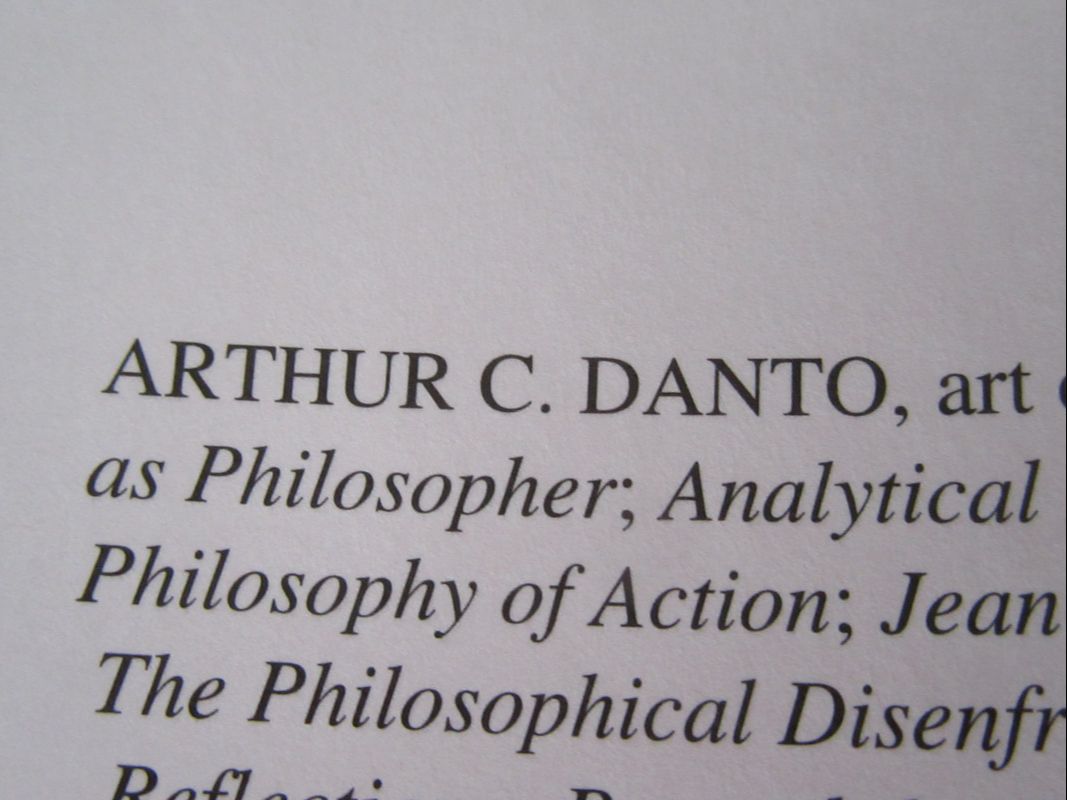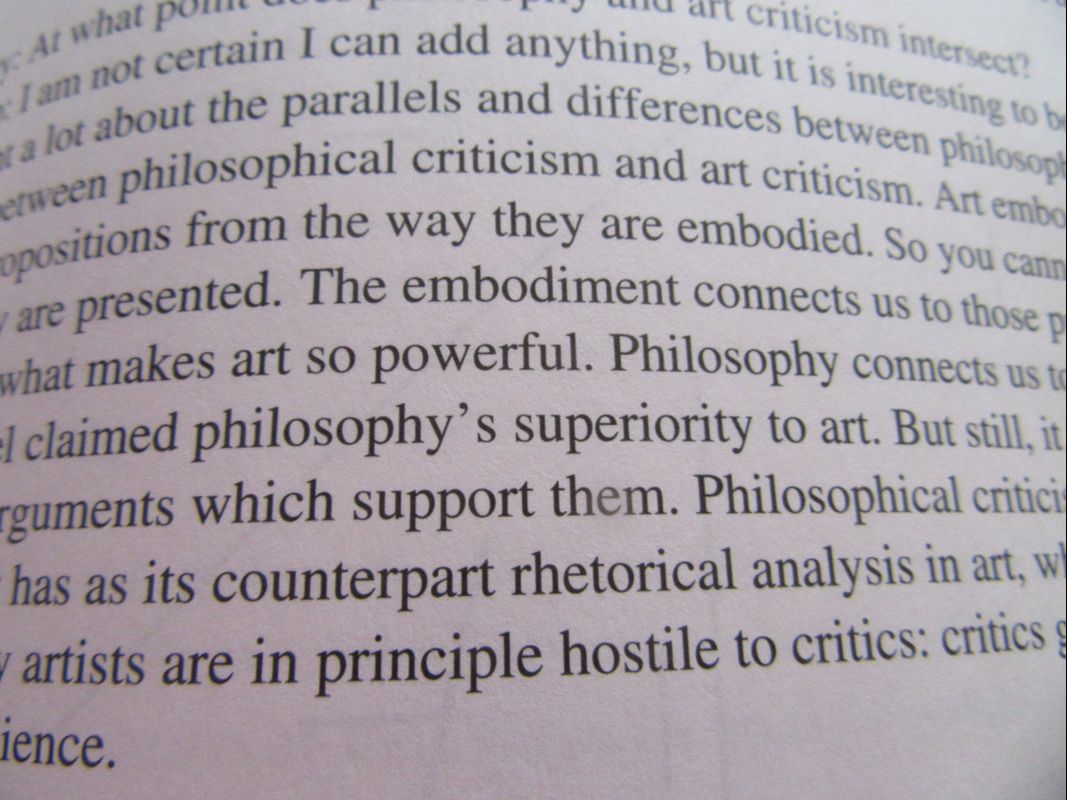Arthur C. Danto: I received the Ph.d. and got a regular position at Columbia the year my first child was born, and we were bitterly poor at that time. My first wife was not a healthy person, and so was unable to work, but she probably would not have had she been hale, for in those days women believed in devoting themselves entirely to motherhood. That was before feminism. Those were very hard years. I was trying to make two reputations, as a philosopher and as an artist, and it was the latter that kicked in first. Because I actually sold work, we were able to live above the poverty line, but it created a certain suspiciousness in my senior colleagues, who wondered about my wholeheartedness and dedication. At one point I was told, officially, not to expect tenure at Columbia, and that was a terrible blow. We felt ourselves established in a certain way in New York, and we would have to move. I felt there was a great injustice, inasmuch as I thought I was really a pretty talented philosopher, as much so at least as those who did seem likely to get tenure. So that was pretty bleak. Then the department changed its mind, and I did get tenure about a year before I came to decide I did not want to be an artist any more. In 1965, I published two books, Analytical Philosophy of History and Nietzsche as Philosopher. Those made my reputation, and professionally I was pretty much all set. I threw myself into working out a philosophical system, and published a lot, and that was my life until I became an art critic in 1984. I encountered no problem, really, in being accepted as an artist, a philosopher, a critic. I had real difficulties in academic acceptance, but that was overcome. I am by nature a happy person, but I cannot pretend that my life was happy: marriage and family life were pretty fraught, and I am certain part of that was my fault. I was widowed in 1978, and that was the great period of sexual openness, so I plunged, like Saint Augustine in Carthage, into a cauldron of fleshly experience. I was lucky in meeting my second wife, whose temperament is almost exactly my own. But I was probably easier to live with by the time we married, since my life had worked out. On the subject of having any tough years of trying to make it all work, money, prestige Veery: What is art? Arthur C. Danto: I chipped away at that in the Transfiguration. Hegel talks about the intellectual judgement of art as involving two questions (I paraphrase): identification of the content, and identification of the content’s presentation. So it is art when the mode of presentation has to be taken into consideration in identifying it as art. And of course, there has to be content in the first place. A work of art is a meaning given embodiment, hence there are nice analogies to person as an embodied soul. I am certain there are more conditions, but these will carry you a certain distance in philosophy, and probably as far as you need to be carried in criticism. Criticism, other than of content, is really of the mode of embodiment. Veery: Do you find you have personalized your creative process around your habits, schedule? Or do you veto your schedule, habits, and just go full tilt, damn the calendar? Arthur C. Danto: This is a wonderful question, and one I have thought about a great deal. There is a kind of perfect fit between my habits and my creative processes in the sense that I have made creativity into a habit and assigned it a schedule. I write with great regularity, so many hours a day - usually about three - and always stop before I am finished so that I will be able to start right off the next day. "Full tilt" would destroy that sense of leaving a little bit over, never running the tank to Empty, and always finding the next day that it has refilled itself overnight. Once I stop writing, my mind goes blank. I never think about what I am writing. My sense is that the creativity is taking place somewhere to which I have no direct access. Anyway, what happens with the rest of my time is not important: teaching, reading, seeing shows, writing checks, running things (I ran the Philosophy Department at Columbia for seven years). I think one can form oneself to be systemically productive, and I try to show my students how to do so. My own experience, by the way, was based on something I found in Jane Austen. She was a maiden aunt, expected to help with the domestic chores. She would be able to stop in the middle of a word, change the diaper or whatever, and then go back and complete the word. She didn’t yell "Can’t you see I’m writing Pride and Prejudice? I need some peace and quiet!" I had small children when I encountered this, and Jane became my model (I named my younger daughter after her). I kept my writing apart from my life, but gave life priority when it needed it. As domestic life settled down, I was able to fix my schedule. But even now it is religious only in the sense that I follow it as religiously as I can, giving in to life when life is peremptory. What I don’t do is give into work when it nags me to just go on, write another page. The thing is to form productive habits, but don’t let them turn you into a machine. Veery: Before you got into art, what was on your mind as art is on your mind today? Arthur C. Danto: When art was on my mind, before I got into art criticism, it was so in different ways. As an artist, I was interested in getting something right, in solving certain problems, in producing a certain effect. As a philosopher, I was interested in what accounts for art being art, a question prompted by Warhol’s Brillo Box. As a critic, I look for explanations of what makes a piece of art the piece of art that it is. I see it as a problem to be solved. If it does not present itself to me as problem, I probably cannot write very interestingly about it. When art was on my mind as a philosopher, as it was, always, before I got into criticism, it was always as part of something larger. The issue of the ontological status of art was part of an overall concern with ontology; the issue of the identity conditions of art came up in connection with an overall philosophical preoccupation with identity, et cetera. I think, now that you have put the question, that the way art was on my mind when I was in my moody teens, as magical and mysterious presences - rapturous saints, women in satin skirts, horsemen on rearing steeds, tables spread with oysters and ewers and peeled lemons - is something I have drawn on ever since. Veery 1995 |
|
|

